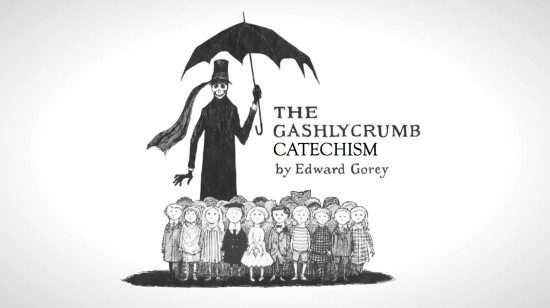Here is the beginning of the Westminster Children’s Catechism:
Q: Who made you?
A: God made me.
Q: What else did God make?
A: God made me and all things.
Q: Why did God make you and all things?
A: God made me and all things for His own glory.
You can look this catechism up online, but I didn’t do that here. I typed that from memory because it was so thoroughly drummed into my head at Timothy Christian School, where we memorized it from a BJU Press textbook (!).
Even 40 years later, if you were to wake me from a deep sleep asking “Who made you?” I would respond “God made me … God made me and all things for His own glory! What’s going on? How did you get in my bedroom?”
I have a Baptist aversion to catechisms in general, and this particular catechism goes off the rails fairly quickly. It’s not quite as creepy as, say, Isaac Watts’ children’s catechism from 1730 — the one with “Then I shall be a wicked Child, and the great God will be very angry with me.” But it’s still plenty creepy.
Much of the rest of this “children’s” catechism offers a warped, fear-driven theology that reads more like something from Edward Gorey than anything from St. Paul.

Still, though, I remain fond of those first three questions and responses. That’s good stuff. Solid. It does what this children’s catechism was apparently intended to do, which is to provide children with a simple, easy-to-understand grounding in basic orthodoxy. (I suppose that’s what the rest of this catechism was also intended to do, but after those initial questions it shifts from instruction in orthodoxy to instruction in anti-heresy, which turns out to be very much not the same thing. The latter isn’t even compatible with the former.)
Anyway, because I reflexively remember — and also choose to believe — those initial questions and answers, that was the first thing I thought of when I read this post from our neighborhood Friendly Atheists: “GOP Lawmaker: Israel and the US Were ‘Created for God’s Glory.’”
This seemed like an exciting and unusual opportunity. I don’t often get the chance to agree with Republican lawmakers these days, and particularly not with this specific GOP Representative — the trigger-happy, Q-devoted seditionist from Colorado, Lauren Boebert. But it seemed like here, beneath the umbrella of the catechism above, we had at last found grounds for agreement. Israel and the US are, indeed, aspects of the “all things” that God made for God’s own glory.*
Alas, that turns out to be not quite what Boebert said and not at all what she meant. She wasn’t including Israel and the US in the category of “all things.” She was excluding them from it, declaring them to be exceptional.
What Boebert said was this: “There have been two nations created for God’s glory, Israel and the United States of America. We will glorify God!”
This is clearly intended to mean that “There have been two” and only two nations “created for God’s glory.” That apart from Israel and the United States of America, no other nation exists “for God’s glory.” Not Canada or Mexico, or Ireland, or France, or Jordan, or Malta, or Botswana, or Japan, or the Navajo. Only the modern nation-state of Israel and the modern nation-state of the United States of America. Those are the two exceptional nations — the only two that were “created for God’s glory.”
There are several levels of Extremely Wrong operating here — Alps upon Alps of heresy, chauvinism, ignorance, and outright white supremacy. Whole libraries could be written on the various forms of ignorance, irrationality, and immorality that feed into and flow from Boebert’s claim. Those libraries would include several volumes dedicated to Boebert’s facile identification of the modern nation of Israel with the people of Israel in the Hebrew scriptures, and her unsupported, pseudo-Mormon grafting of the U.S. into that biblical narrative. But we needn’t get into all of that here.
My point here is simply this: Boebert is claiming that most of the world — more than 7 billion people “and also much cattle” — does not exist “for God’s glory.”
That’s an explicit contradiction of the children’s catechism. Christian nationalism insists on that contradiction, and thus insists on rejecting the affirmations of those first three questions of that catechism. It is not possible to embrace Christian nationalism while also affirming that “God made me and all things for God’s glory.”
What does it mean when you tell God that you have decided that most of God’s creation does not glorify God? What does it mean to tell God you think billions of God’s children, created in and bearing God’s image, do not bear witness to the glory of their creator?
To quote Isaac Watts, I believe that makes the great God very angry.
* This is where the notion of a children’s catechism gets tricky and why the idea of a catechism for children seems fated to veer off into Gorey-esque directions:
Q: What else did God make?
A: God made me and all things.
Q: Why did God make you and–
A: Did God make coronavirus?
Q: What?
A: If God made “all things,” then what about coronavirus? Or measles? Or …?
Q: That’s not how this works. I ask the questions.
A: We’re children. Have you ever met children?
Q: So you’re asking if God is the author of evil?
A: We’re kids. We don’t talk like that. But, yeah.
Q: God made all things, but not evil.
A: So God didn’t make all things?
Q: Look, we’re getting to that later, OK?
A: With a satisfying answer?
Q: Well, no, with a sophisticated regression of strategic retreats that we hope will–
A: Did God make SpongeBob? Do you watch SpongeBob? Did you see the one where …












